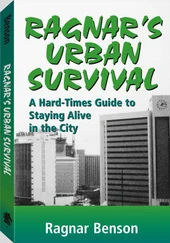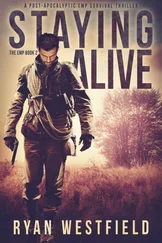Ragnar Benson - Ragnar's Urban Survival - A Hard-Times Guide to Staying Alive in the City
Здесь есть возможность читать онлайн «Ragnar Benson - Ragnar's Urban Survival - A Hard-Times Guide to Staying Alive in the City» весь текст электронной книги совершенно бесплатно (целиком полную версию без сокращений). В некоторых случаях можно слушать аудио, скачать через торрент в формате fb2 и присутствует краткое содержание. Год выпуска: 2009, ISBN: 2009, Жанр: Старинная литература, на английском языке. Описание произведения, (предисловие) а так же отзывы посетителей доступны на портале библиотеки ЛибКат.
- Название:Ragnar's Urban Survival: A Hard-Times Guide to Staying Alive in the City
- Автор:
- Жанр:
- Год:2009
- ISBN:1581600593
- Рейтинг книги:5 / 5. Голосов: 1
-
Избранное:Добавить в избранное
- Отзывы:
-
Ваша оценка:
- 100
- 1
- 2
- 3
- 4
- 5
Ragnar's Urban Survival: A Hard-Times Guide to Staying Alive in the City: краткое содержание, описание и аннотация
Предлагаем к чтению аннотацию, описание, краткое содержание или предисловие (зависит от того, что написал сам автор книги «Ragnar's Urban Survival: A Hard-Times Guide to Staying Alive in the City»). Если вы не нашли необходимую информацию о книге — напишите в комментариях, мы постараемся отыскать её.
Ragnar's Urban Survival: A Hard-Times Guide to Staying Alive in the City — читать онлайн бесплатно полную книгу (весь текст) целиком
Ниже представлен текст книги, разбитый по страницам. Система сохранения места последней прочитанной страницы, позволяет с удобством читать онлайн бесплатно книгу «Ragnar's Urban Survival: A Hard-Times Guide to Staying Alive in the City», без необходимости каждый раз заново искать на чём Вы остановились. Поставьте закладку, и сможете в любой момент перейти на страницу, на которой закончили чтение.
Интервал:
Закладка:
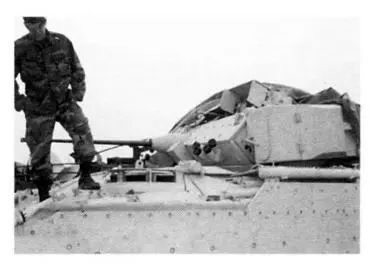
The modern Bradley fighting vehicle, often used to deliver a squad of infantry into built-up areas, has more firepower than World War II main battle tanks.
Yet changes in our society are occurring at a breathtaking rate. Our military recognizes this truth when it prepares to fight in cities. Unstoppable events, including dramatic advances in technology way beyond our control (and perhaps even our understanding), are pushing all of us into living in built-up areas. These areas are characterized by high population densities and large numbers of buildings, and put us in great danger of dependence on government for goods and services.
But back in New York on the phone with the men's magazine reporter, my question was, "What absolutely vital goods and services necessary to daily existence do you rely on that are provided by the government?"
His answer was a no-brainer in more ways than one. "Absolutely nothing," he quickly thundered back. That these people are all cut from similar cloth should not be a surprise. He was now had by the ears, but he didn't quite know it. Sounded familiar.
"Oh," says I, affecting my best innocence, "then you can own a firearm of some sort, thereby taking personal responsibility for your own immediate security?" Keep in mind it was New York on the line, where personal responsibility for security has been lost for decades.
"Why would I even dream of owning a gun? I don't want to attack anyone," was his instant response. Obviously he was from one of those new touchy-feely type of men's magazines that wouldn't touch articles about guns, cockfighting, cigars, or bear hunting on a bet.
There are those among us who believe that our president's cur rent tirade against gun owners is not really about diverting attention from his many other shortcomings, but rather a thinly disguised attempt to make average citizens more dependent on government. This theory gains credibility when we realize again that our police forces have no binding legal responsibility to protect us! Citizens have repeatedly tried to sue for damages when they were denied permission to own a gun for self-protection and were subsequently attacked. Suits for damages against their police departments got nowhere.
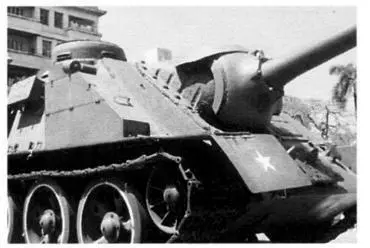
An actual Soviet tank used by Fidel Castro to crush insurgents.
It's true that Thomas Jefferson believed Americans should own firearms as a final last resort against government officials who oppress them. But in this era of wall-to-wall cities, it may be more than that. There is also the matter of government ownership and distribution-either through direct ownership or indirectly through licensing-of electricity, heat, water, communications (radio, phone, and TV), transportation, and postal services. But self-protection is even more at the core than these.
Numerous experts have pointed out that Stalin could never have murdered and carried out deportations in the Ukraine, Mao in northern China, Pol Pot in Cambodia, or England in Scotland (during their 18th-century war of independence) had average citizens been even modestly well armed.
Aleksandr Solzhenitsyn, author and philosopher, believes the Russian people could have even successfully resisted the secret police and going to the gulags with little more than resolute application of axes, butcher knives, harvesting tools, and meat hooks. Sounds like lots of resoluteness, but his idea is duly noted.
The reporter never did admit to seeing the connection between private firearms and freedom, but he seemed to warm to the idea that official provision of sewer, garbage, and water service could quickly lead to significant control. "Fact is," he said, "I vividly recall our garbage strike and what an incredible mess that turned out to be," he finally admitted.
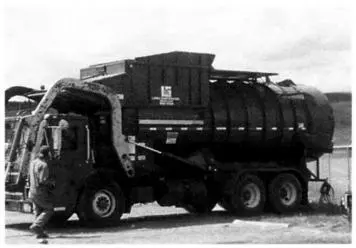
Governments in most places handle waste and garbage. Disposal of these can be a weak link for hiding city survivors.
He did weasel a bit by claiming garbage service was private in New York. "Yes, private, but maintained by a governmentenforced monopoly," I suggested. "All they have to do is threaten to pull the company's permit and your garbage collectors will do whatever the bureaucracy wants. You cannot legally go into any business in New York without official sanction," I reminded him.
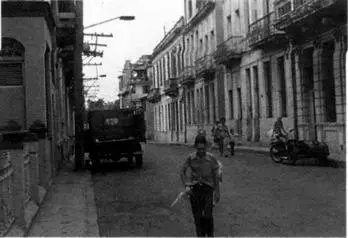
Downtown Havana, Cuba, where compliant citizens are herded into places of complete subjection.
Water is extremely important to city survivors. Failure of supply could be as serious as going without personal protection, and could arguably be as vital or more vital than personal gun ownership. But to claim that garbage is more important than guns is just that.
Other than electric utilities being government-controlled monopolies, is the electrical system in very many big cities in America still directly owned and controlled by the government? During the 1920s and `30s many small, more rural cities developed their own electrical systems-mostly small-scale hydro projects. Currently, even when utility companies are not collectively owned, the authorities can throw their considerable weight around, denying service to anyone they wish. This is exactly how it works in Cuba, where average citizens don't receive enough power each day to successfully run a refrigerator!
Wise city survivors had best look at their own situations now, before the crisis. What essentials to your life do your central authorities provide? Can they arbitrarily and capriciously cut you off, forcing you into becoming a ward of the state?
Forms of government dependence are not all obvious and may vary in priority according to a person's philosophy Service may vary from city to city, and from country to country. In Britain and Canada, for example, citizens must go hat in hand to the bureaucracy for permission to have a vasectomy; a hernia repair, or knee surgery A close friend flew his mother to the United States for a hip replacement because she was too old to receive one in Canada! Bypass surgery is not done in Cuba past the age of 50 because recipients do not have sufficient working life left to give to the state. The United States is headed in that direction. More distressing, some people really believe this is a good thing!
In Beirut, shortly after the very bleak days, private mail courier services sprang up. Again, we must keep our eye on the ball. Establishment of private medical care might be very important. But is mail delivery on our list of absolutes required to sustain life?
On one occasion a woman told my daughter, only half in jest, that she could not envision life without her daily soaps (lowgrade melodramatic entertainment). Possession of a functional TV cable, satellite dish, or computer connection might possibly be a requirement for her life. That is certainly not a judgment I wish to make.
Like any other survivors, city survivors must start planning now if they hope to provide their own services. It's very important to note that, on close inspection, we often find many of these services are provided by central authorities. Anne Frank, the young Jewish girl in World War Il Holland, almost survived. She wrote that at times a chronic lack of sewage/waste disposal actually threatened their sanity, security, and immediate health.
Читать дальшеИнтервал:
Закладка:
Похожие книги на «Ragnar's Urban Survival: A Hard-Times Guide to Staying Alive in the City»
Представляем Вашему вниманию похожие книги на «Ragnar's Urban Survival: A Hard-Times Guide to Staying Alive in the City» списком для выбора. Мы отобрали схожую по названию и смыслу литературу в надежде предоставить читателям больше вариантов отыскать новые, интересные, ещё непрочитанные произведения.
Обсуждение, отзывы о книге «Ragnar's Urban Survival: A Hard-Times Guide to Staying Alive in the City» и просто собственные мнения читателей. Оставьте ваши комментарии, напишите, что Вы думаете о произведении, его смысле или главных героях. Укажите что конкретно понравилось, а что нет, и почему Вы так считаете.


